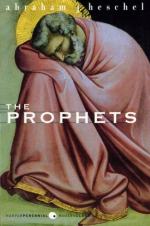
|
| Name: _________________________ | Period: ___________________ |
This test consists of 15 multiple choice questions and 5 short answer questions.
Multiple Choice Questions
1. Heschel says the problem is not that we depict God incorrectly but what?
(a) He does not see depicting God as a problem.
(b) That we don't know how to depict Him.
(c) That we can't depict Him.
(d) That we try to depict Him at all.
2. Whose theory said that the prophets were not talking to God but were making judgments about God's desires from the information they had about God?
(a) Spinoza.
(b) Nietzsche.
(c) Goethe.
(d) Philo.
3. To what does Heschel compare the descriptions of prophecy?
(a) Religious fervor.
(b) Grace and holiness.
(c) Poetry.
(d) Religious literature.
4. What does Heschel define as the belief in the temporary separation of the soul from the body when a person is asleep, sick, or in a trance state?
(a) Prophecy.
(b) Ecstasy.
(c) Sympathy.
(d) Pathos.
5. Heschel states that it is important to distinguish between the objective and subjective aspects of what?
(a) Biblical prophecy.
(b) The prophetic consciousness of God.
(c) Religious sympathy.
(d) Ecstasy.
6. How is God's love to man shown?
(a) By giving us what we want.
(b) By showing us what we should do.
(c) By being righteous.
(d) By giving us a connection with God.
7. What cultural/religious doctrines did Philo try to mix in his studies?
(a) Greek and Islamic.
(b) Egyptian and Islamic.
(c) Jewish and Egyptian.
(d) Greek and Jewish.
8. According to some scholars, the goal should not be pathos but what?
(a) Knowledge.
(b) Understanding.
(c) Apathy.
(d) Wisdom.
9. God's anger is great and to be feared, but God is also what?
(a) Rational.
(b) Compassionate.
(c) Vengeful.
(d) Just.
10. When the pathos of God is upon a prophet what happens?
(a) He becomes angry.
(b) He becomes overwhelmed.
(c) He becomes compassionate.
(d) He becomes apathetic.
11. When talking about the inspiration for poetry, who says "One does not ask who gives."
(a) Plato.
(b) Democritus.
(c) Goethe.
(d) Nietzsche.
12. According to Heschel, many parts of the Bible should be looked at as what?
(a) Poems.
(b) Songs.
(c) Essays.
(d) Allegories.
13. Heschel uses prophets from what regions or religions that used ecstasy to verify his viewpoint?
(a) Egypt and Greek.
(b) Shiite and Greek.
(c) Islam and Mesopotamia.
(d) Egypt and Mesopotamia.
14. Heschel contrasts God to other deities, who unlike God, did not have what?
(a) Power to make heaven and earth.
(b) Power to intervene in people's lives.
(c) Absolute supreme power.
(d) Power to change history.
15. In addition to using information from Israel's culture, Heschel uses information from what in order to understand the prophets?
(a) Egyptian culture.
(b) Greek culture.
(c) Islamic culture.
(d) Cult of the Balaam.
Short Answer Questions
1. Who declared ecstasy to be a definitive mark of a prophet?
2. In early Israel, the gift of poetry was regarded as what?
3. One view that Heschel discusses is that an outstanding feature of a poet's consciousness is the sense of being what at the moment of inspiration?
4. What attitude does Heschel take to other points of view that he uses in his book?
5. What does Heschel describe as not a goal, but a challenge, a commitment, a state of tension?
|
This section contains 497 words (approx. 2 pages at 300 words per page) |

|




